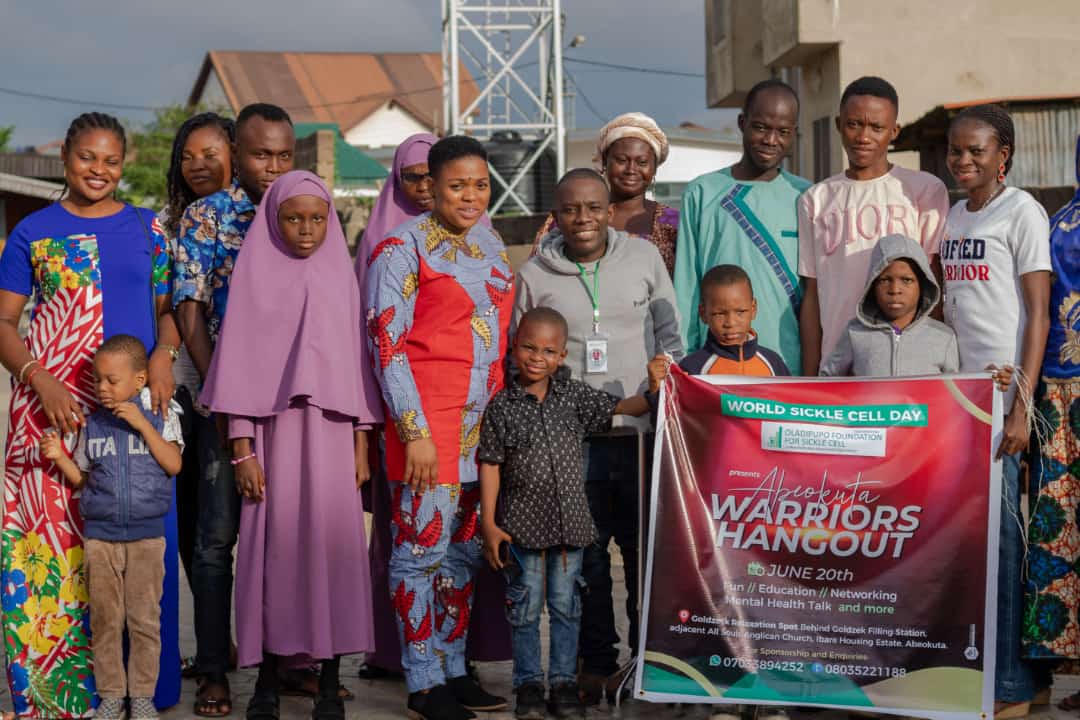Not until Dotun Oladipupo was 13 years old that he realised he had sickle cell disease or SCD. Growing up in his village of Idofa-Imeko Afon in Ogun State, Oladipupo’s parents had consulted several remedies to manage his health condition – including instructions to stay off certain foods, sports and environment.
“You will have to miss school classes or be exempted from a lot of activities because of health reasons, and if there are things you really want to do, being exempted might not help one’s psychology”, the 36-year-old warrior said.
SCD is hereditary blood and genetic condition present at birth. It is inherited when a child receives two sickle cell genes from both parents (one from each). It is diagnosed with a simple blood test.
SCD warriors could experience complications like stroke (because the Sickle cells can block blood flow to the brain), acute chest syndrome, hypertension, organ damage, blindness, leg ulcers, and gallstones.
The exact number of people living with SCD worldwide is unknown, but the estimation is in millions. However, the World Health Organisation says at least 300,000 children are born with the disease every year globally. And a 2018 research published in the Journal of Global Health says the global prevalence is 112 per every 100 000 live births.
The research says Africa bears the highest burden – 1125 per 100 000 live births (with more than 50% dying before they turn five) compared with Europe, where the prevalence rate is just 43.12 per 100000 births.
At the country level, another study published in The Lancet journal last year shows that Nigeria has the highest prevalence, with at least 1.21% of all children born every year in Nigeria down with SCD. About seven million babies are born in Nigeria every year, so 1.21% of newborns with SCD means Nigeria records as much as 84,700 new SCD cases every year.
“A lot still needs to be done in the area of awareness. People are still ignorant about the genotype issues before marriage, and the government can play a big role in educating the citizens on this through the media”, said Saheed Ayilara, a family physician at the Federal Medical Center in Abeokuta.
The only cure for SCD is bone marrow or stem cell transplant (replacing damaged blood cells with healthy ones). But because of high cost and the risks involved – possible excessive bleeding, infection, tiredness, rashes and others) – the transplant is rarely done.
According to experts, taking pain killers and medications to prevent the creation of sickle-shaped red blood cells, exercising regularly but moderately, drinking plenty of water, taking folic acid and healthy diets, and avoiding extreme temperatures could prevent severe complications.
In Nigeria, where over a third of the population lives in extreme poverty, most CSD warriors cannot sustainably afford these medical and dietary supplies to manage their condition.
Starting a foundation
In the early 2000s, Oladipupo had to forgo his admission to study law at the University of Abuja for health reasons. Though he later completed a degree programme in mass communication at Moshood Abiola Polytechnic in Ogun State, complications arose just after graduation: spinal issues, skeletal imbalance, and anaemia that matured into avascular necrosis or AVN (the death of bone tissue due to a lack of blood supply).
After fundraising through social media, he travelled to Apollo Hospital in New Delhi, India, for two bilateral hip replacements.
“I could not walk or stand, and I had to be on the bed for about two years,” he said. “I am averagely fine now; AVN surgery can turn you into a disabled man with a lot of limitations to physical activities, and this can be very depressing to the emotion and psychologies.”
With his firsthand experience, Oladipupo decided to start helping others with CSD. He began by sharing his medications with CSD warriors around him.
“Having suffered virtually all of the complications associated with sickle cell, I knew the right drug I could administer or advise someone in the same shoes as mine. I just had to do something to help others heal their pains,” he said.
In 2009, he started the Oladipupo Foundation for Sickle Cell, registering it officially in 2012 as an association of CSD warriors. Located in Abeokuta, Ogun State, the foundation offers medical and emotional support to its 50 members. It gains more members through recommendations from hospitals and its members.
“We relieve the pains of people living with sickle cell by paying hospital bills and giving out routine medications. The schedule of the program is [once] monthly. What we do is to get together people living with sickle cell, organise some therapy, encouragement, distribute some free drugs, listen to their challenges and experiences in hospitals and how we can improve on those challenges,” he said.
Oladipupo Foundation for Sickle Cell also runs campaigns to create awareness about CSD and inform youths to check the compatibility of their genotype with that of their partners before marriage.
“We run enlightenment campaigns…on television like Television Continental, Ogun State Television and radio. We also go to churches, youth camps and schools in Ogun State for sensitisation,” he said.
“On national or religious holidays [and international days like Valentine’s Day and World Sickle Cell Day – July 19], we organise programs that educate our warriors and the public about genotype and other related topics associated with SCD. We share food packages to celebrate the occasion and make sure our warriors enjoy the celebration. Sometimes it is not about the medical effort but the activities that surround the care [and the] love and empathy that is being shown.”
The foundation raises funds: “through crowdfunding and reaching out to covenant partners,” Oladipopu said. “During specific programs like world sickle cell day, we reach out to corporate organisations. We have been sponsored by Bigi products and a few other corporate organisations and individuals, especially philanthropists who have a long-standing relationship based on trust with us.”
Challenges
But being an association of warriors caring for each other means that when a member experiences complications requiring emergent care, available members of the foundation who might not be feeling well themselves would have to rush that one to a healthcare centre. Oladipupo said on some occasions, several members could be down, bringing a significant amount of stress on members who are medically not supposed to undertake stressful activities.
“It’s [about] looking out for each other, each taking his turn to do his bits. Movement of warriors during emergencies is a big issue, as well as financial constraints,” he said, adding that getting a hospital to attend to emergencies is also sometimes difficult.
“Identifying hospitals who are willing to admit warriors during emergencies is another challenge because of the bottleneck and bureaucracy in government-owned hospitals, especially FMCs (federal medical centres). The pressure on such facilities limits the quality and timeliness of care accessible. [And] the funds to run into privately-owned hospitals are [sometimes] not available.”
Recently, the foundation started partnering with private health facilities “who will take in warriors during emergencies, give treatment till we are able to raise funds to pay them.”
They advocate for government institutions to allocate job slots to sickle cell warriors to raise funds for their health support.
“Healthcare services for SCD are expensive, and [we regularly] need to arrange therapy sessions to find a way to manage [our] situation. The demands are overwhelming, with limited resources to meet them. [High] unemployment rate within this group also makes it harder,” Oladipupo said.
Dotun Oladipupo discovered he had sickle cell disease (SCD) at 13. SCD is a hereditary blood condition where the presence of two sickle cell genes leads to various complications like stroke, organ damage, and blindness. Globally prevalent, SCD is most burdensome in Africa, with Nigeria recording the highest incidence.
Managing SCD is challenging due to the high costs of necessary treatments like bone marrow transplants and ongoing medical care. In Nigeria, many cannot afford these treatments, exacerbating the impact of the disease. Oladipupo, having experienced severe complications himself, established the Oladipupo Foundation for Sickle Cell in 2009 to support others with the condition.
The foundation offers medical and emotional support, raises awareness about SCD, and encourages genotype compatibility checks before marriage. Despite financial and logistical challenges, including the difficulty accessing emergency healthcare, the foundation strives to assist SCD warriors through education, medication distribution, and fundraising efforts.
Oladipupo emphasizes empathy and creating a supportive community, campaigning for government and private sector support to improve the lives of SCD sufferers.






